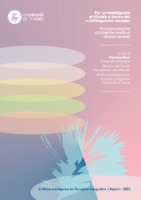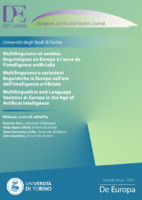Sfoglia documenti (2 in totale)
Sort by:
Per un’intelligenza artificiale a favore del multilinguismo europeo Raccomandazioni strategiche rivolte ai decisori europei How artificial intelligence can further European multilingualism Strategic recommendations for European decision-makers
Il presente report intende fornire ai policy e decision makers dell’Unione europea degli argomenti e dei dati utili al fine d’investire su un’intelligenza artificiale a favore del multilinguismo europeo, proponendo quattro raccomandazioni specifiche. A tale scopo, il gruppo di lavoro sulle attività linguistiche che si è costituito attorno alla rete del Centro d’eccellenza Jean Monnet Artificial Intelligence for European Integration (AI4EI) a Torino ha inteso far dialogare persone esperte nei settori della linguistica, della glottodidattica, della traduzione, dell’analisi del discorso, dell’informatica e dell’ingegneria per l’informazione così da produrre dati e ricerche sull’impatto dell’IA nel settore dell’industria delle lingue e sul multilinguismo dell’Unione europea.
This report aims to provide Eueropean Unione policy and decision makers some arguments and data or facts useful in order to invest in artificial intelligence for European multilingualism, proposing four specific recommendations. To this end, the working group on linguistic language, which was formed around the network of the Jean Monnet Center of Excellence Artificial Intelligence for European Integration (AI4EI) in Turin, Italy, aimed to bring together people who are experts in the the fields of linguistics, glottodidactics, translation, discourse analysis, computer science and information engineering in order to produce facts and research on the impact of AI in the language industry and on multilingualism in the European Union.
This report aims to provide Eueropean Unione policy and decision makers some arguments and data or facts useful in order to invest in artificial intelligence for European multilingualism, proposing four specific recommendations. To this end, the working group on linguistic language, which was formed around the network of the Jean Monnet Center of Excellence Artificial Intelligence for European Integration (AI4EI) in Turin, Italy, aimed to bring together people who are experts in the the fields of linguistics, glottodidactics, translation, discourse analysis, computer science and information engineering in order to produce facts and research on the impact of AI in the language industry and on multilingualism in the European Union.
Multilinguisme et variétés linguistiques en Europe à l’aune de l’intelligence artificielle
Multilinguismo e variazioni linguistiche in Europa nell’era dell’intelligenza artificiale
Multilingualism and Language Varieties in Europe in the Age of Artificial Intelligence
Ce numéro spécial de la revue De Europa a été élaboré à partir d’une réflexion interdisciplinaire et multilingue qui a été menée dans le cadre d’une recherche sur les droits, le multilinguisme et les variétés linguistiques en Europe à l’aune de l’intelligence artificielle à l’intérieur du projet Artificial Intelligence for European Integration promu par le Centre d’études européennes To-EU de l’Université de Turin et cofinancé par la Commission de l’Union européenne. Notre propos était de réfléchir plus généralement sur les conséquences négatives et/ou positives de l’IA sur les variétés linguistiques et le multilinguisme, ce dernier étant une valeur de l’UE. Ce que nous proposons par ce numéro est un livre inédit qui peut se vanter d’être parmi les premiers à s’occuper de ce type de thématique, du moins en Europe.
Il presente numero speciale di De Europa è il frutto di una riflessione interdisciplinare e multilingue maturata attorno a diversi eventi organizzati nell’ambito del panel concernente i diritti e le variazioni linguistiche in Europa nell’era dell’intelligenza artificiale all’interno del progetto Artificial Intelligence for European Integration, promosso dal Centro studi sull’Europa TO-EU dell’Università di Torino e cofinanziato dalla Commissione europea. L’interrogativo iniziale che abbiamo voluto sollevare è se l’IA potesse avere un impatto negativo sulle varietà linguistiche e sul multilinguismo, valore “aggiunto” dell’UE, o se potesse, e in che modo, divenire utile per la promozione di essi. Il volume, interamente inedito, può dirsi tra i primi ad affrontare, almeno in Europa, questo tipo di tematiche.
This special issue of De Europa is the outcome of an interdisciplinary multilingual reflection carried out on research into linguistic rights, multilingualism and language varieties in Europe in the age of artificial intelligence. It is part of the Artificial Intelligence for European Integration project, promoted by the Centre of European Studies To-EU of the University of Turin and co-financed by the European Commission. Our aim was to investigate more generally the negative and/or positive outcomes of AI on language varieties and multilingualism, the latter a key value for the EU. The result is a volume of original unpublished research being made generally available for the first time, at least in Europe.


